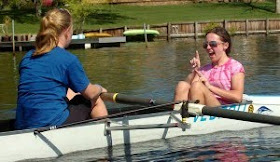Deaf high school rower and her coxswain create a successful team via sign language

From
The Press of Atlantic City:
MAYS LANDING, N.J. — Katelyn Poley feels the wind on her face, the vibration of the boat and the spray of water against her skin as she rows for the Oakcrest High School girls crew team.
She hears nothing.
Poley was born deaf but she is able to row competitively because Casey Rowlinson, the coxswain on her boat, uses sign language to signal race tactics and practice drills. (Both are pictured.)
“Crew makes me feel like a normal person,” Poley said.
Rowlinson can empathize with Poley. Rowlinson struggled with speech issues growing up and used sign language between the ages of 3 and 6.
“It was kind of fate,” Rowlinson said of now being paired with Poley.
The sign language has spread through the team. Poley has taught some teammates simple sign language phrases such as “good job,” which is the right hand to the lips followed by the tapping of the wrists together. Coach Vince Sera uses some signs to communicate with the team.
“It’s really cool,” he said. “I’m starting to realize there are so many different ways to be connected to each other.”
Poley, a 15-year-old freshman, and Rowlinson, a 16-year-old sophomore, are members of the Falcons’ novice four boat.
“Katelyn can do everything everyone else does. Instead of being able to hear it, she sees it,” Sera said.
Rowlinson is in charge of the boat as the coxswain. She decides the pace at which the rowers pull and encourages them.
Poley sits in the stroke position right in front of Rowlinson. The stroke position is reserved for the boat’s most technically sound rower. The rest of the rowers follow the stroke’s lead.
That’s why it’s so crucial for Poley to understand Rowlinson.
The two have developed their own language — some of it based on actual sign language and the rest improvised.
Crew teams do not row at the same rate during a race. If a team rows faster for 10 strokes, the boat is called a “power 10.” If the pace is faster for 20 strokes, it’s called “a power 20.”
To indicate a power-10 move, Rowlinson will pump her fist and shake her thumb side to side.
To indicate it’s time for a power-20 move, Rowlinson will pump her fist and then act as if she’s pinching something between her fingers.
Rowlinson said the signals are often easier for her than shouting instructions.
“I speak with my hands a lot,” she said. “To have somebody I have to speak to with my hands is fun.”
Oakcrest practices Tuesday through Friday at Lake Lenape in Mays Landing. Poley and Rowlinson were quick to smile as they sat on picnic benches near the lake for an interview before last Tuesday’s workout.
Poley and Rowlinson didn’t know each other before this season but are friends now, often hanging out together in gym class. Rowlinson lives on Long Avenue in Mays Landing. Poley is from Third Avenue in Weymouth Township.
Poley uses a hearing aid at school and home. She can read lips and also has an interpreter help her at school.
But she can’t use the aid when she rows. The device is expensive and could get lost. The aid also could be ruined if it gets wet.
Poley played sports her whole life and grew up on the water.
“I was always fishing, water skiing,” she said. “I do everything. I’m used to being on the water.”
Her love of the water is what made her come out for the crew team.
Sera said Poley is a natural athlete and rower.
“She has a lot of potential,” he said. “She is someone who is very determined. She has a good outlook on life. Whatever position she’s put in, she tries to make the best of it.”
Rowlinson wanted to play a sport in school but she has sore joints that couldn’t take the pounding of basketball or soccer.
“I always wanted to be part of a team,” she said, “but I could never do any high-impact sports, so I picked crew.”
The other members of the novice boat are Nicole Littlefield, Aleeah Smalls and Alexandra Hare.
The boat won an April 11 race in the Manny Flick Regatta Series on the Schuylkill River in Philadelphia and finished sixth at the Garden State Scholastic Rowing Championships on the Cooper River in Camden on April 24.
Rowlinson and Poley aren’t sure why they were paired together.
“A lot of it was luck,” Sera said. “But (Poley) and Casey kind of clicked together. That whole boat just happened to row well together. We call it hitting together. They just naturally have a rhythm.”
The members of a crew boat get to know each other very well. They spend long hours practicing together on the water with no one else to talk to.
“We’re already close and (signing) brings us even closer,” Rowlinson said.
Sign language is now a common sight at Oakcrest practices.
If a boat gets too far ahead during practice, Sera signals for it to stop. If the boats are lined up across from each other, he signals the rate at which he wants them to row.
“We all kind of know sign language,” Sera said. “I’m able to sign to the girls and we know what’s going on. It’s changed my team as a whole.”
 From The Press of Atlantic City:
From The Press of Atlantic City: